Business Ethics and Leadership: Ethical Dilemma Case Study Analysis
VerifiedAdded on 2022/08/13
|8
|1974
|22
Project
AI Summary
This assignment presents an in-depth analysis of ethical dilemmas in a business setting, utilizing a case study to explore the complexities of ethical leadership and stakeholder relationships. The analysis begins with a reflection on a debate concerning ethical leadership in a shareholder-driven economy, examining the perspectives of various characters, including a businessman, a CEO, and others, and relating their viewpoints to ethical theories such as deontology, feminist ethics, utilitarianism, and egoism. The assignment then delves into a specific case study involving a young advertising agency and its employees, identifying key stakeholders and their ethical dilemmas, while also exploring the application of normative and descriptive ethical frameworks. The case study highlights the challenges of balancing personal and professional responsibilities, especially in a high-pressure work environment. The assignment concludes with a reflection on teamwork and its importance in understanding ethical perspectives in business. The assignment also explores the application of business ethics in various situations to yield the maximum beneficial result.
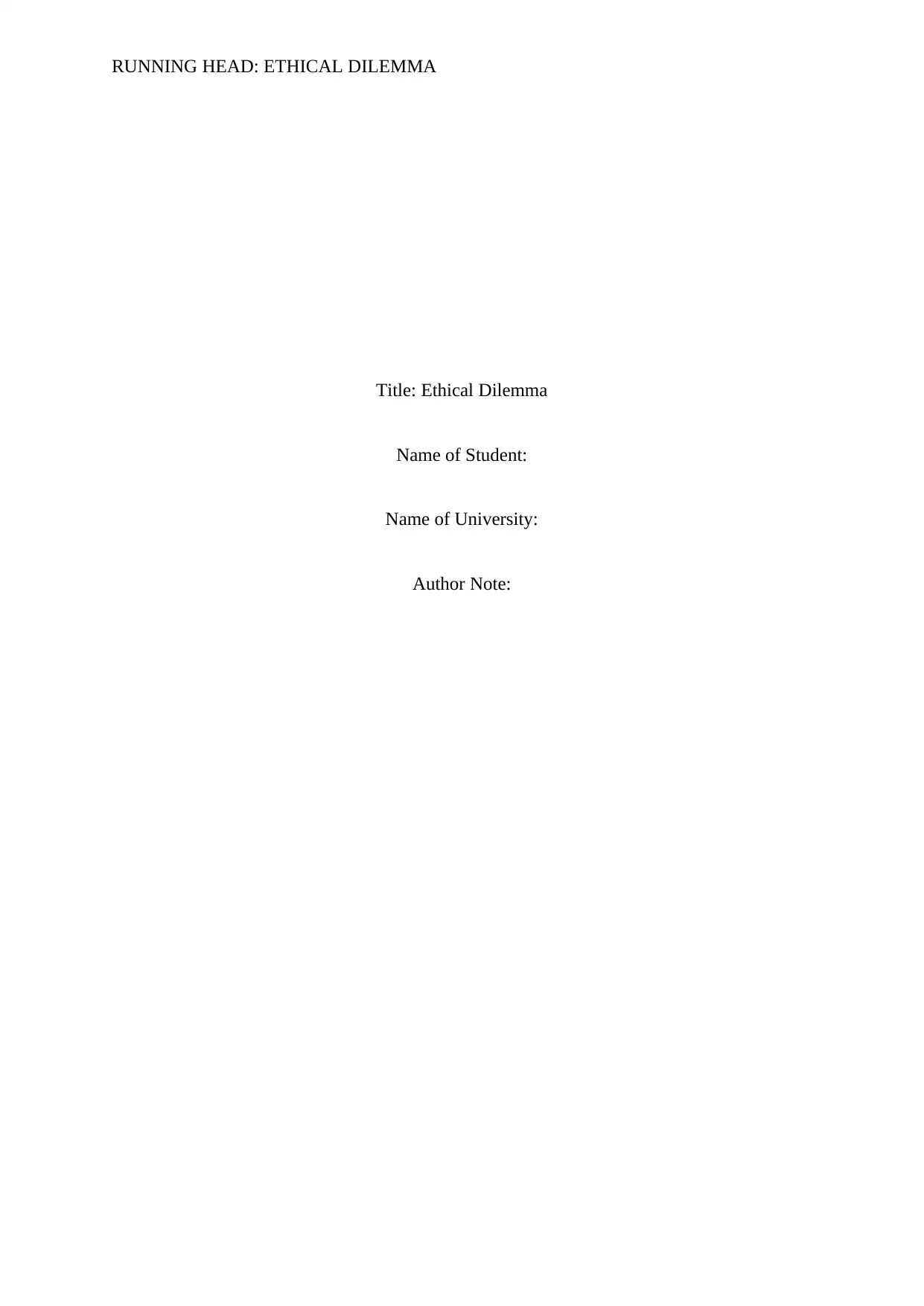
RUNNING HEAD: ETHICAL DILEMMA
Title: Ethical Dilemma
Name of Student:
Name of University:
Author Note:
Title: Ethical Dilemma
Name of Student:
Name of University:
Author Note:
Paraphrase This Document
Need a fresh take? Get an instant paraphrase of this document with our AI Paraphraser
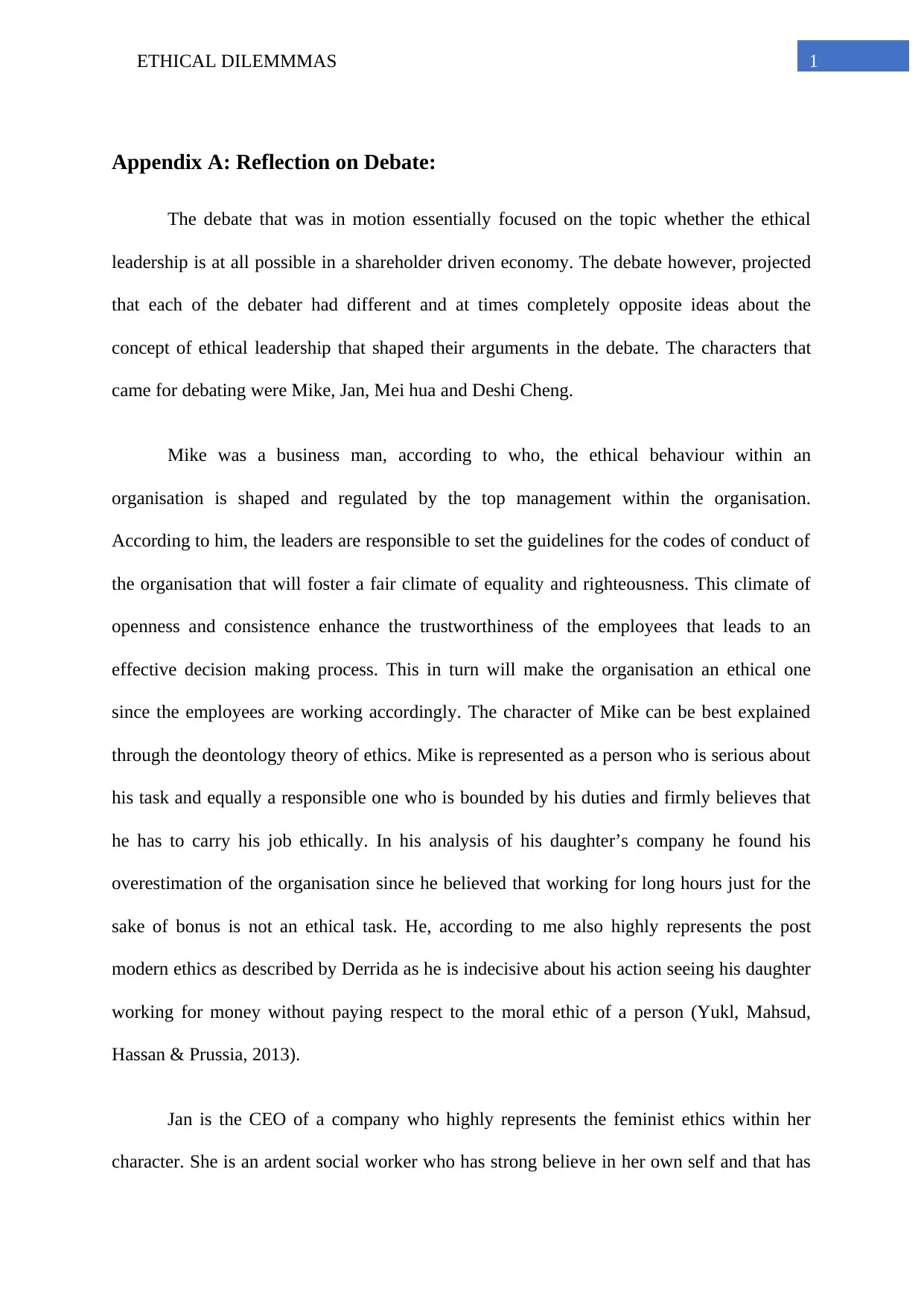
1ETHICAL DILEMMMAS
Appendix A: Reflection on Debate:
The debate that was in motion essentially focused on the topic whether the ethical
leadership is at all possible in a shareholder driven economy. The debate however, projected
that each of the debater had different and at times completely opposite ideas about the
concept of ethical leadership that shaped their arguments in the debate. The characters that
came for debating were Mike, Jan, Mei hua and Deshi Cheng.
Mike was a business man, according to who, the ethical behaviour within an
organisation is shaped and regulated by the top management within the organisation.
According to him, the leaders are responsible to set the guidelines for the codes of conduct of
the organisation that will foster a fair climate of equality and righteousness. This climate of
openness and consistence enhance the trustworthiness of the employees that leads to an
effective decision making process. This in turn will make the organisation an ethical one
since the employees are working accordingly. The character of Mike can be best explained
through the deontology theory of ethics. Mike is represented as a person who is serious about
his task and equally a responsible one who is bounded by his duties and firmly believes that
he has to carry his job ethically. In his analysis of his daughter’s company he found his
overestimation of the organisation since he believed that working for long hours just for the
sake of bonus is not an ethical task. He, according to me also highly represents the post
modern ethics as described by Derrida as he is indecisive about his action seeing his daughter
working for money without paying respect to the moral ethic of a person (Yukl, Mahsud,
Hassan & Prussia, 2013).
Jan is the CEO of a company who highly represents the feminist ethics within her
character. She is an ardent social worker who has strong believe in her own self and that has
Appendix A: Reflection on Debate:
The debate that was in motion essentially focused on the topic whether the ethical
leadership is at all possible in a shareholder driven economy. The debate however, projected
that each of the debater had different and at times completely opposite ideas about the
concept of ethical leadership that shaped their arguments in the debate. The characters that
came for debating were Mike, Jan, Mei hua and Deshi Cheng.
Mike was a business man, according to who, the ethical behaviour within an
organisation is shaped and regulated by the top management within the organisation.
According to him, the leaders are responsible to set the guidelines for the codes of conduct of
the organisation that will foster a fair climate of equality and righteousness. This climate of
openness and consistence enhance the trustworthiness of the employees that leads to an
effective decision making process. This in turn will make the organisation an ethical one
since the employees are working accordingly. The character of Mike can be best explained
through the deontology theory of ethics. Mike is represented as a person who is serious about
his task and equally a responsible one who is bounded by his duties and firmly believes that
he has to carry his job ethically. In his analysis of his daughter’s company he found his
overestimation of the organisation since he believed that working for long hours just for the
sake of bonus is not an ethical task. He, according to me also highly represents the post
modern ethics as described by Derrida as he is indecisive about his action seeing his daughter
working for money without paying respect to the moral ethic of a person (Yukl, Mahsud,
Hassan & Prussia, 2013).
Jan is the CEO of a company who highly represents the feminist ethics within her
character. She is an ardent social worker who has strong believe in her own self and that has
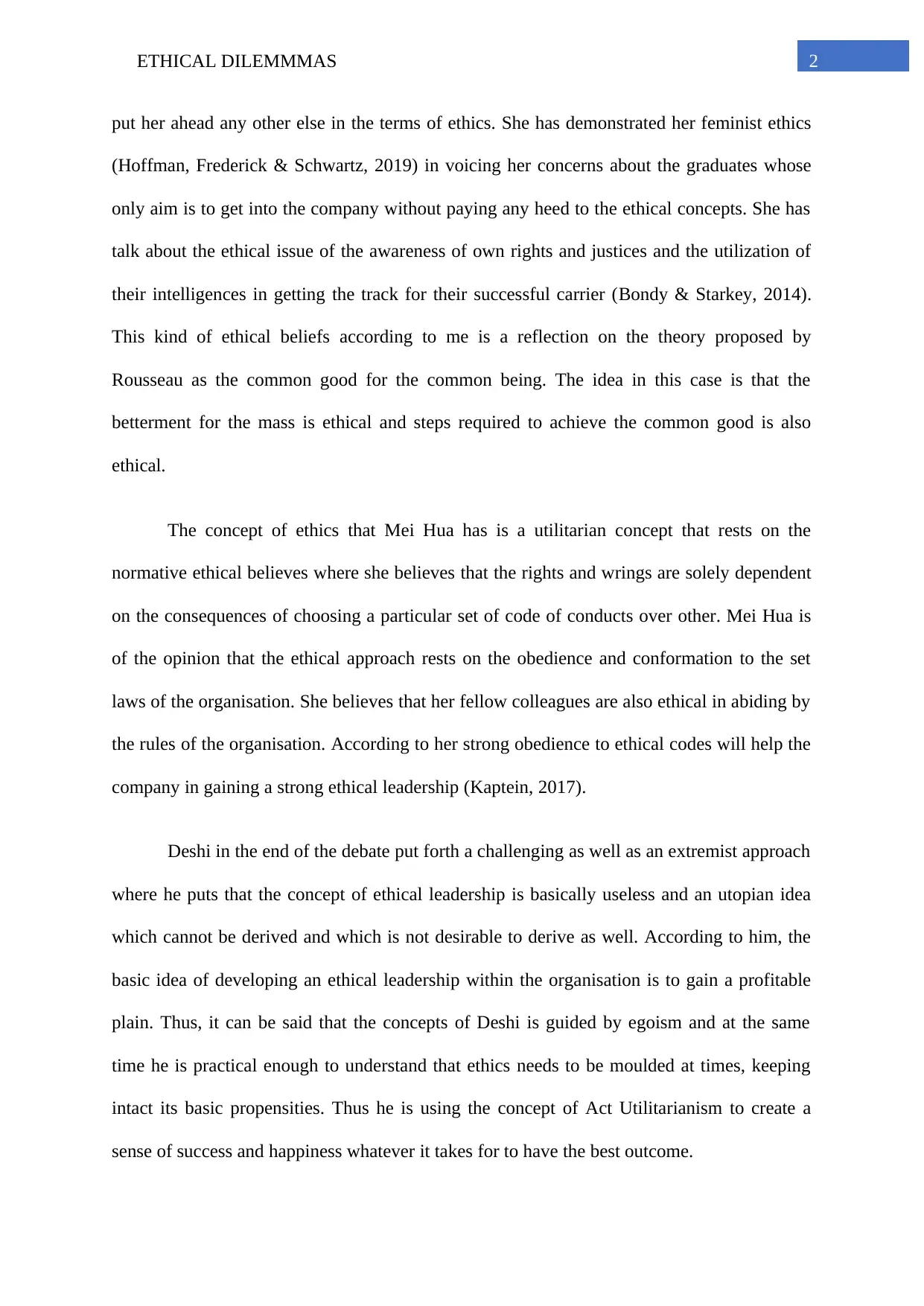
2ETHICAL DILEMMMAS
put her ahead any other else in the terms of ethics. She has demonstrated her feminist ethics
(Hoffman, Frederick & Schwartz, 2019) in voicing her concerns about the graduates whose
only aim is to get into the company without paying any heed to the ethical concepts. She has
talk about the ethical issue of the awareness of own rights and justices and the utilization of
their intelligences in getting the track for their successful carrier (Bondy & Starkey, 2014).
This kind of ethical beliefs according to me is a reflection on the theory proposed by
Rousseau as the common good for the common being. The idea in this case is that the
betterment for the mass is ethical and steps required to achieve the common good is also
ethical.
The concept of ethics that Mei Hua has is a utilitarian concept that rests on the
normative ethical believes where she believes that the rights and wrings are solely dependent
on the consequences of choosing a particular set of code of conducts over other. Mei Hua is
of the opinion that the ethical approach rests on the obedience and conformation to the set
laws of the organisation. She believes that her fellow colleagues are also ethical in abiding by
the rules of the organisation. According to her strong obedience to ethical codes will help the
company in gaining a strong ethical leadership (Kaptein, 2017).
Deshi in the end of the debate put forth a challenging as well as an extremist approach
where he puts that the concept of ethical leadership is basically useless and an utopian idea
which cannot be derived and which is not desirable to derive as well. According to him, the
basic idea of developing an ethical leadership within the organisation is to gain a profitable
plain. Thus, it can be said that the concepts of Deshi is guided by egoism and at the same
time he is practical enough to understand that ethics needs to be moulded at times, keeping
intact its basic propensities. Thus he is using the concept of Act Utilitarianism to create a
sense of success and happiness whatever it takes for to have the best outcome.
put her ahead any other else in the terms of ethics. She has demonstrated her feminist ethics
(Hoffman, Frederick & Schwartz, 2019) in voicing her concerns about the graduates whose
only aim is to get into the company without paying any heed to the ethical concepts. She has
talk about the ethical issue of the awareness of own rights and justices and the utilization of
their intelligences in getting the track for their successful carrier (Bondy & Starkey, 2014).
This kind of ethical beliefs according to me is a reflection on the theory proposed by
Rousseau as the common good for the common being. The idea in this case is that the
betterment for the mass is ethical and steps required to achieve the common good is also
ethical.
The concept of ethics that Mei Hua has is a utilitarian concept that rests on the
normative ethical believes where she believes that the rights and wrings are solely dependent
on the consequences of choosing a particular set of code of conducts over other. Mei Hua is
of the opinion that the ethical approach rests on the obedience and conformation to the set
laws of the organisation. She believes that her fellow colleagues are also ethical in abiding by
the rules of the organisation. According to her strong obedience to ethical codes will help the
company in gaining a strong ethical leadership (Kaptein, 2017).
Deshi in the end of the debate put forth a challenging as well as an extremist approach
where he puts that the concept of ethical leadership is basically useless and an utopian idea
which cannot be derived and which is not desirable to derive as well. According to him, the
basic idea of developing an ethical leadership within the organisation is to gain a profitable
plain. Thus, it can be said that the concepts of Deshi is guided by egoism and at the same
time he is practical enough to understand that ethics needs to be moulded at times, keeping
intact its basic propensities. Thus he is using the concept of Act Utilitarianism to create a
sense of success and happiness whatever it takes for to have the best outcome.
⊘ This is a preview!⊘
Do you want full access?
Subscribe today to unlock all pages.

Trusted by 1+ million students worldwide
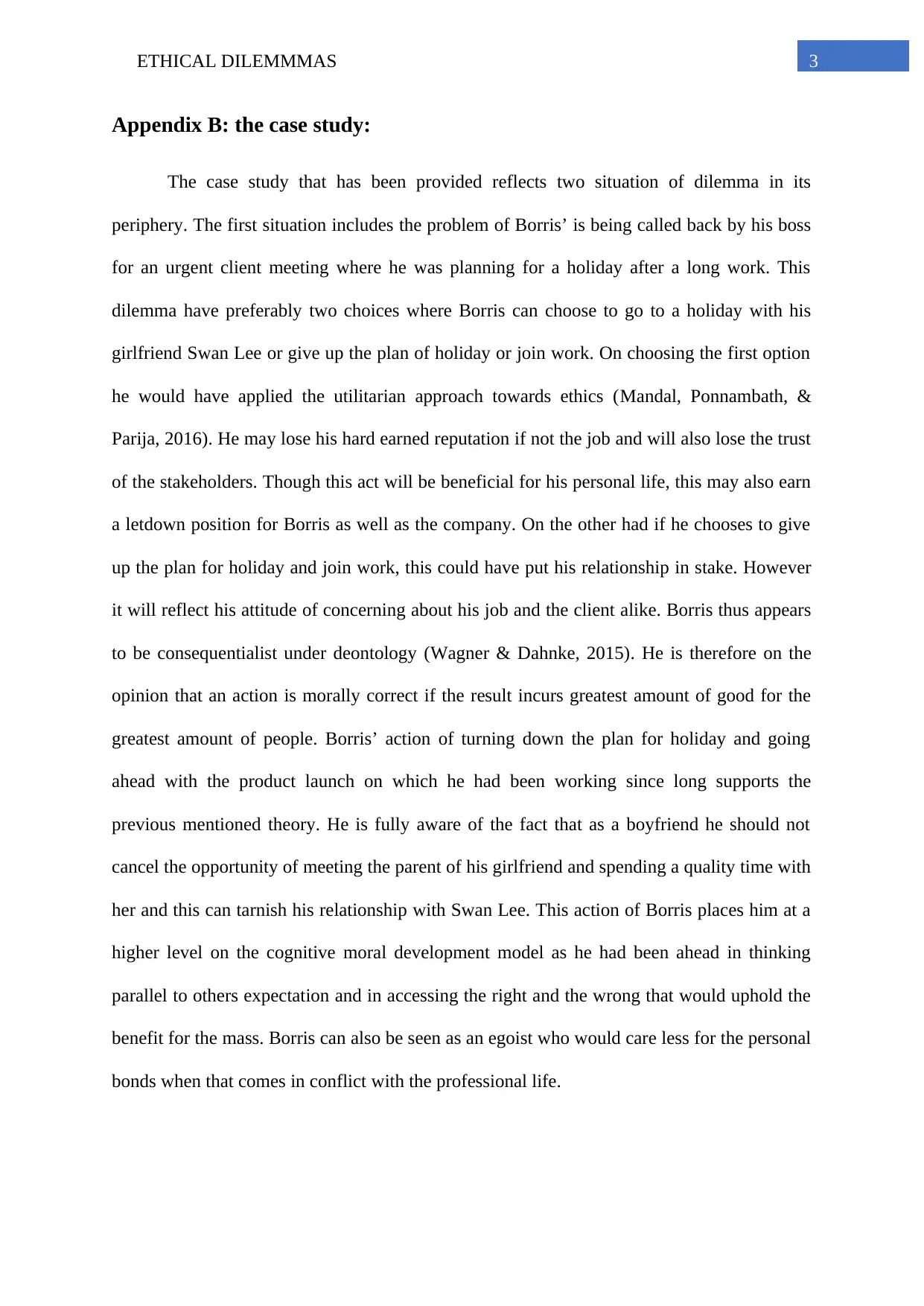
3ETHICAL DILEMMMAS
Appendix B: the case study:
The case study that has been provided reflects two situation of dilemma in its
periphery. The first situation includes the problem of Borris’ is being called back by his boss
for an urgent client meeting where he was planning for a holiday after a long work. This
dilemma have preferably two choices where Borris can choose to go to a holiday with his
girlfriend Swan Lee or give up the plan of holiday or join work. On choosing the first option
he would have applied the utilitarian approach towards ethics (Mandal, Ponnambath, &
Parija, 2016). He may lose his hard earned reputation if not the job and will also lose the trust
of the stakeholders. Though this act will be beneficial for his personal life, this may also earn
a letdown position for Borris as well as the company. On the other had if he chooses to give
up the plan for holiday and join work, this could have put his relationship in stake. However
it will reflect his attitude of concerning about his job and the client alike. Borris thus appears
to be consequentialist under deontology (Wagner & Dahnke, 2015). He is therefore on the
opinion that an action is morally correct if the result incurs greatest amount of good for the
greatest amount of people. Borris’ action of turning down the plan for holiday and going
ahead with the product launch on which he had been working since long supports the
previous mentioned theory. He is fully aware of the fact that as a boyfriend he should not
cancel the opportunity of meeting the parent of his girlfriend and spending a quality time with
her and this can tarnish his relationship with Swan Lee. This action of Borris places him at a
higher level on the cognitive moral development model as he had been ahead in thinking
parallel to others expectation and in accessing the right and the wrong that would uphold the
benefit for the mass. Borris can also be seen as an egoist who would care less for the personal
bonds when that comes in conflict with the professional life.
Appendix B: the case study:
The case study that has been provided reflects two situation of dilemma in its
periphery. The first situation includes the problem of Borris’ is being called back by his boss
for an urgent client meeting where he was planning for a holiday after a long work. This
dilemma have preferably two choices where Borris can choose to go to a holiday with his
girlfriend Swan Lee or give up the plan of holiday or join work. On choosing the first option
he would have applied the utilitarian approach towards ethics (Mandal, Ponnambath, &
Parija, 2016). He may lose his hard earned reputation if not the job and will also lose the trust
of the stakeholders. Though this act will be beneficial for his personal life, this may also earn
a letdown position for Borris as well as the company. On the other had if he chooses to give
up the plan for holiday and join work, this could have put his relationship in stake. However
it will reflect his attitude of concerning about his job and the client alike. Borris thus appears
to be consequentialist under deontology (Wagner & Dahnke, 2015). He is therefore on the
opinion that an action is morally correct if the result incurs greatest amount of good for the
greatest amount of people. Borris’ action of turning down the plan for holiday and going
ahead with the product launch on which he had been working since long supports the
previous mentioned theory. He is fully aware of the fact that as a boyfriend he should not
cancel the opportunity of meeting the parent of his girlfriend and spending a quality time with
her and this can tarnish his relationship with Swan Lee. This action of Borris places him at a
higher level on the cognitive moral development model as he had been ahead in thinking
parallel to others expectation and in accessing the right and the wrong that would uphold the
benefit for the mass. Borris can also be seen as an egoist who would care less for the personal
bonds when that comes in conflict with the professional life.
Paraphrase This Document
Need a fresh take? Get an instant paraphrase of this document with our AI Paraphraser
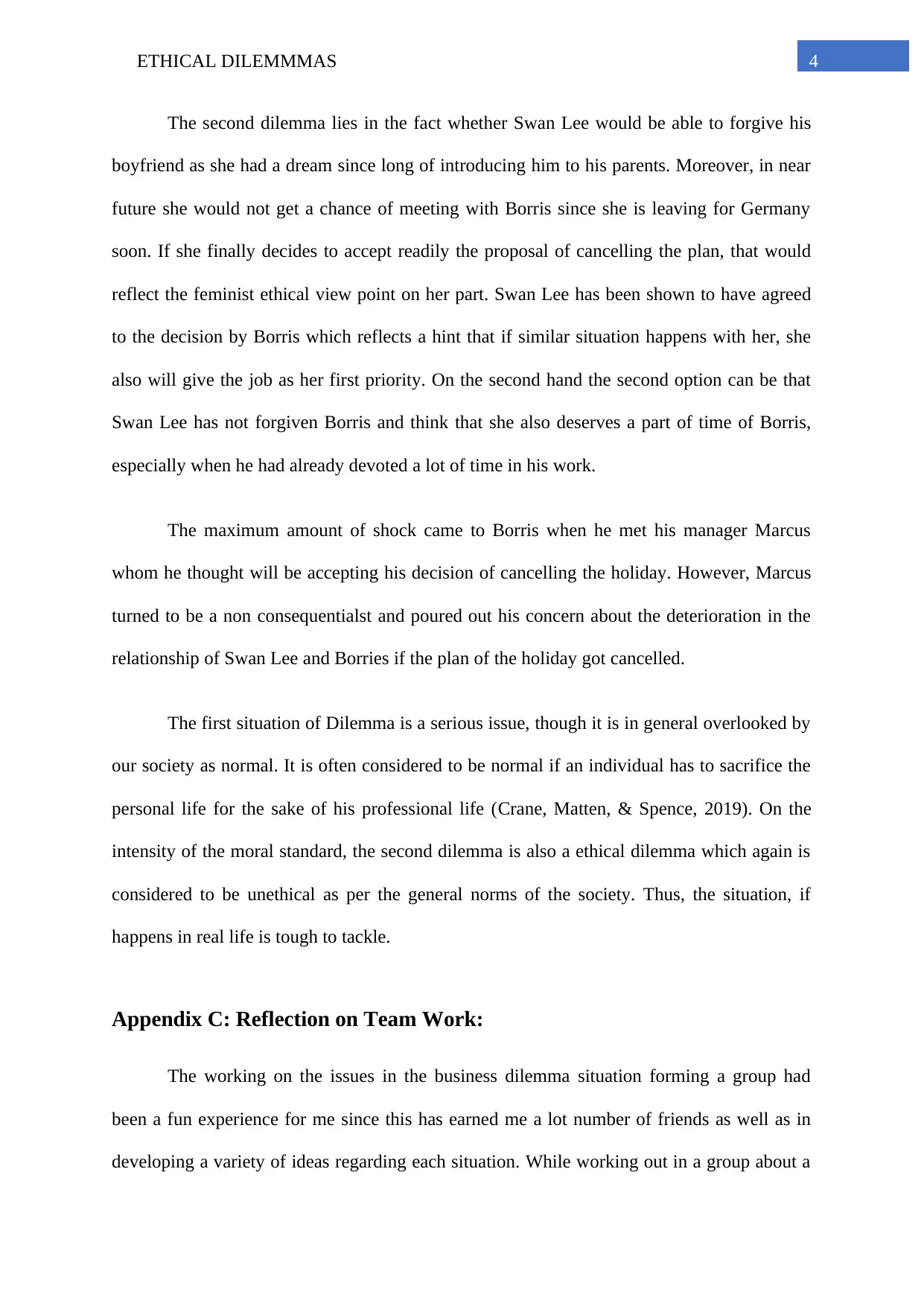
4ETHICAL DILEMMMAS
The second dilemma lies in the fact whether Swan Lee would be able to forgive his
boyfriend as she had a dream since long of introducing him to his parents. Moreover, in near
future she would not get a chance of meeting with Borris since she is leaving for Germany
soon. If she finally decides to accept readily the proposal of cancelling the plan, that would
reflect the feminist ethical view point on her part. Swan Lee has been shown to have agreed
to the decision by Borris which reflects a hint that if similar situation happens with her, she
also will give the job as her first priority. On the second hand the second option can be that
Swan Lee has not forgiven Borris and think that she also deserves a part of time of Borris,
especially when he had already devoted a lot of time in his work.
The maximum amount of shock came to Borris when he met his manager Marcus
whom he thought will be accepting his decision of cancelling the holiday. However, Marcus
turned to be a non consequentialst and poured out his concern about the deterioration in the
relationship of Swan Lee and Borries if the plan of the holiday got cancelled.
The first situation of Dilemma is a serious issue, though it is in general overlooked by
our society as normal. It is often considered to be normal if an individual has to sacrifice the
personal life for the sake of his professional life (Crane, Matten, & Spence, 2019). On the
intensity of the moral standard, the second dilemma is also a ethical dilemma which again is
considered to be unethical as per the general norms of the society. Thus, the situation, if
happens in real life is tough to tackle.
Appendix C: Reflection on Team Work:
The working on the issues in the business dilemma situation forming a group had
been a fun experience for me since this has earned me a lot number of friends as well as in
developing a variety of ideas regarding each situation. While working out in a group about a
The second dilemma lies in the fact whether Swan Lee would be able to forgive his
boyfriend as she had a dream since long of introducing him to his parents. Moreover, in near
future she would not get a chance of meeting with Borris since she is leaving for Germany
soon. If she finally decides to accept readily the proposal of cancelling the plan, that would
reflect the feminist ethical view point on her part. Swan Lee has been shown to have agreed
to the decision by Borris which reflects a hint that if similar situation happens with her, she
also will give the job as her first priority. On the second hand the second option can be that
Swan Lee has not forgiven Borris and think that she also deserves a part of time of Borris,
especially when he had already devoted a lot of time in his work.
The maximum amount of shock came to Borris when he met his manager Marcus
whom he thought will be accepting his decision of cancelling the holiday. However, Marcus
turned to be a non consequentialst and poured out his concern about the deterioration in the
relationship of Swan Lee and Borries if the plan of the holiday got cancelled.
The first situation of Dilemma is a serious issue, though it is in general overlooked by
our society as normal. It is often considered to be normal if an individual has to sacrifice the
personal life for the sake of his professional life (Crane, Matten, & Spence, 2019). On the
intensity of the moral standard, the second dilemma is also a ethical dilemma which again is
considered to be unethical as per the general norms of the society. Thus, the situation, if
happens in real life is tough to tackle.
Appendix C: Reflection on Team Work:
The working on the issues in the business dilemma situation forming a group had
been a fun experience for me since this has earned me a lot number of friends as well as in
developing a variety of ideas regarding each situation. While working out in a group about a
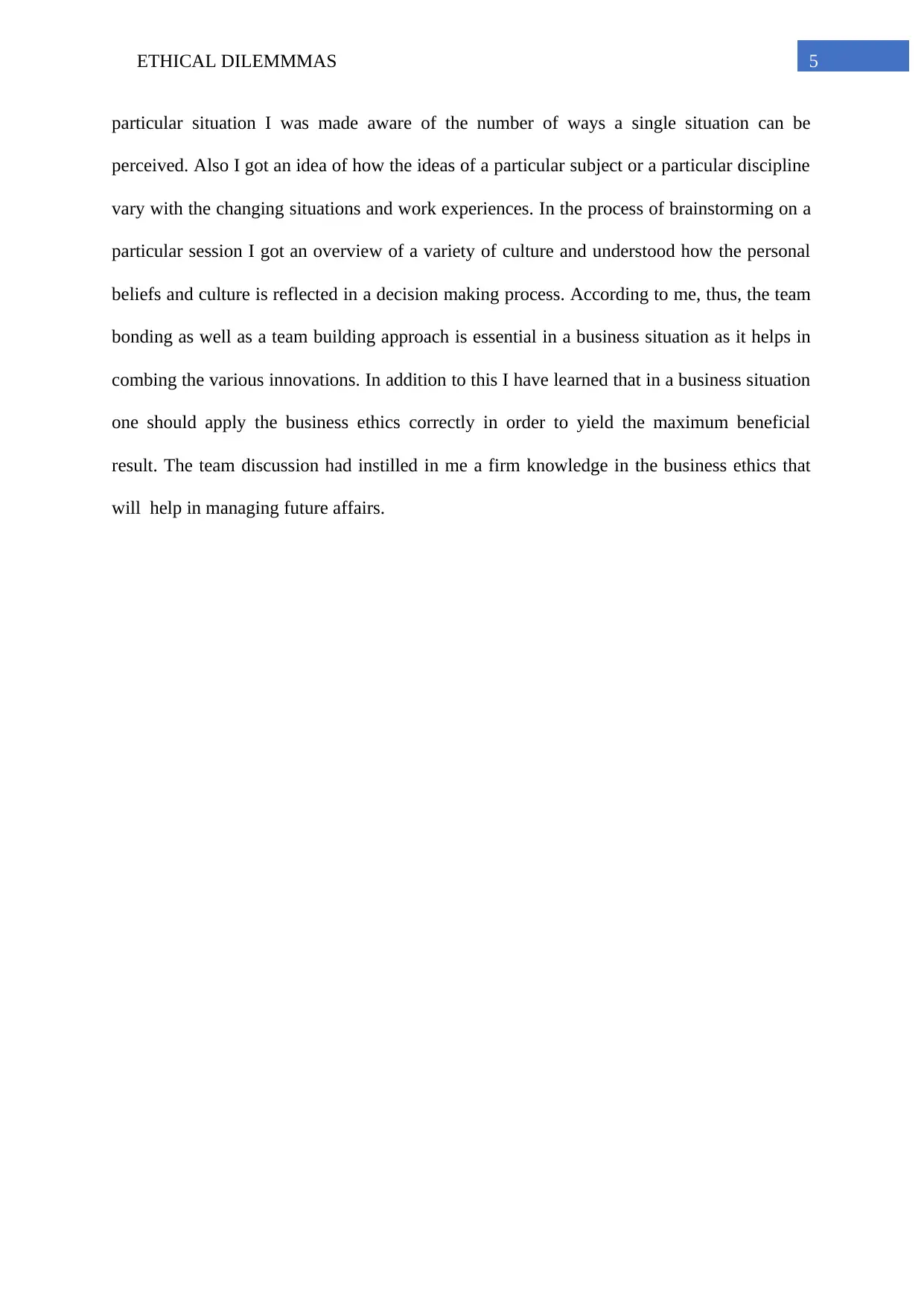
5ETHICAL DILEMMMAS
particular situation I was made aware of the number of ways a single situation can be
perceived. Also I got an idea of how the ideas of a particular subject or a particular discipline
vary with the changing situations and work experiences. In the process of brainstorming on a
particular session I got an overview of a variety of culture and understood how the personal
beliefs and culture is reflected in a decision making process. According to me, thus, the team
bonding as well as a team building approach is essential in a business situation as it helps in
combing the various innovations. In addition to this I have learned that in a business situation
one should apply the business ethics correctly in order to yield the maximum beneficial
result. The team discussion had instilled in me a firm knowledge in the business ethics that
will help in managing future affairs.
particular situation I was made aware of the number of ways a single situation can be
perceived. Also I got an idea of how the ideas of a particular subject or a particular discipline
vary with the changing situations and work experiences. In the process of brainstorming on a
particular session I got an overview of a variety of culture and understood how the personal
beliefs and culture is reflected in a decision making process. According to me, thus, the team
bonding as well as a team building approach is essential in a business situation as it helps in
combing the various innovations. In addition to this I have learned that in a business situation
one should apply the business ethics correctly in order to yield the maximum beneficial
result. The team discussion had instilled in me a firm knowledge in the business ethics that
will help in managing future affairs.
⊘ This is a preview!⊘
Do you want full access?
Subscribe today to unlock all pages.

Trusted by 1+ million students worldwide
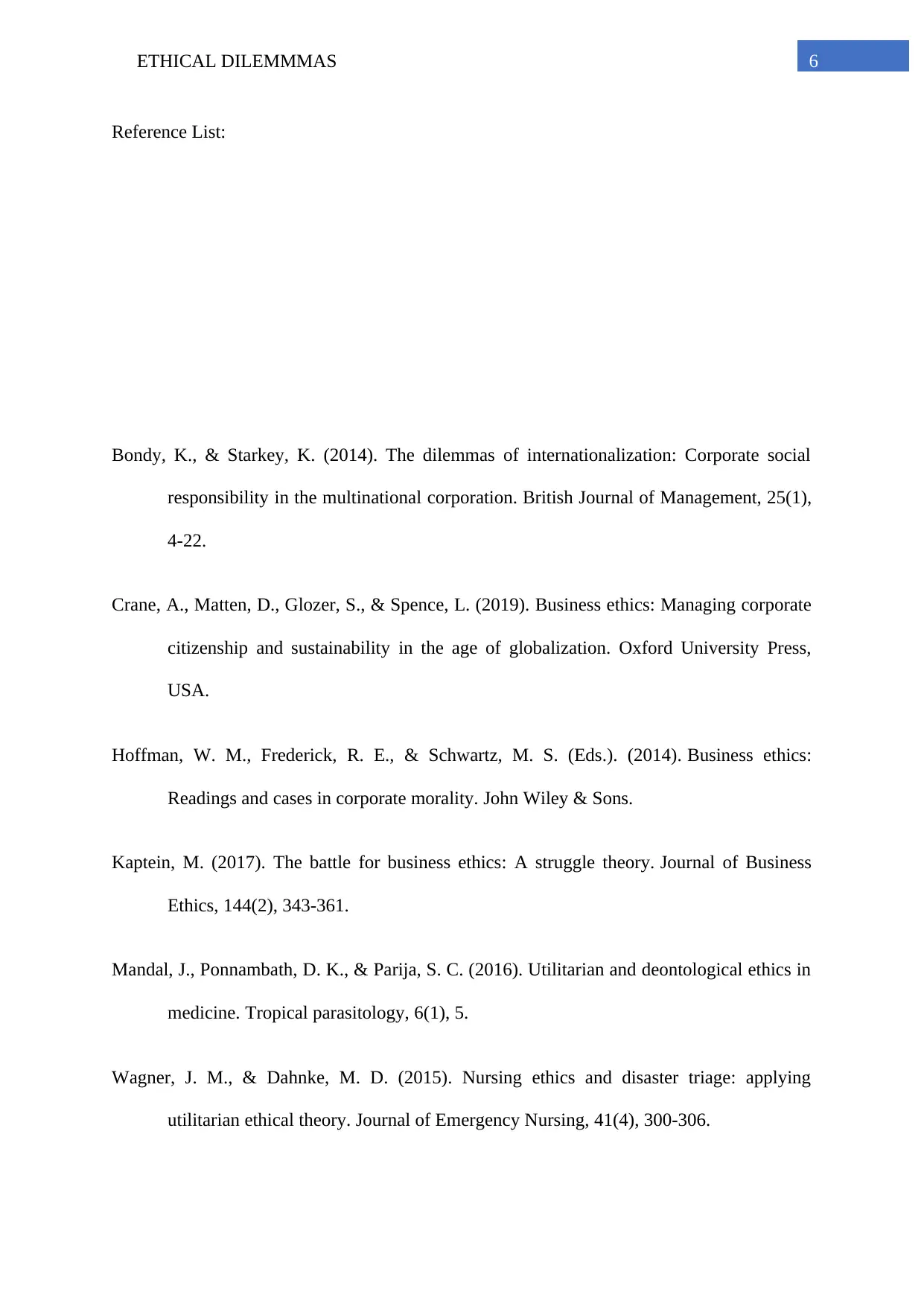
6ETHICAL DILEMMMAS
Reference List:
Bondy, K., & Starkey, K. (2014). The dilemmas of internationalization: Corporate social
responsibility in the multinational corporation. British Journal of Management, 25(1),
4-22.
Crane, A., Matten, D., Glozer, S., & Spence, L. (2019). Business ethics: Managing corporate
citizenship and sustainability in the age of globalization. Oxford University Press,
USA.
Hoffman, W. M., Frederick, R. E., & Schwartz, M. S. (Eds.). (2014). Business ethics:
Readings and cases in corporate morality. John Wiley & Sons.
Kaptein, M. (2017). The battle for business ethics: A struggle theory. Journal of Business
Ethics, 144(2), 343-361.
Mandal, J., Ponnambath, D. K., & Parija, S. C. (2016). Utilitarian and deontological ethics in
medicine. Tropical parasitology, 6(1), 5.
Wagner, J. M., & Dahnke, M. D. (2015). Nursing ethics and disaster triage: applying
utilitarian ethical theory. Journal of Emergency Nursing, 41(4), 300-306.
Reference List:
Bondy, K., & Starkey, K. (2014). The dilemmas of internationalization: Corporate social
responsibility in the multinational corporation. British Journal of Management, 25(1),
4-22.
Crane, A., Matten, D., Glozer, S., & Spence, L. (2019). Business ethics: Managing corporate
citizenship and sustainability in the age of globalization. Oxford University Press,
USA.
Hoffman, W. M., Frederick, R. E., & Schwartz, M. S. (Eds.). (2014). Business ethics:
Readings and cases in corporate morality. John Wiley & Sons.
Kaptein, M. (2017). The battle for business ethics: A struggle theory. Journal of Business
Ethics, 144(2), 343-361.
Mandal, J., Ponnambath, D. K., & Parija, S. C. (2016). Utilitarian and deontological ethics in
medicine. Tropical parasitology, 6(1), 5.
Wagner, J. M., & Dahnke, M. D. (2015). Nursing ethics and disaster triage: applying
utilitarian ethical theory. Journal of Emergency Nursing, 41(4), 300-306.
Paraphrase This Document
Need a fresh take? Get an instant paraphrase of this document with our AI Paraphraser
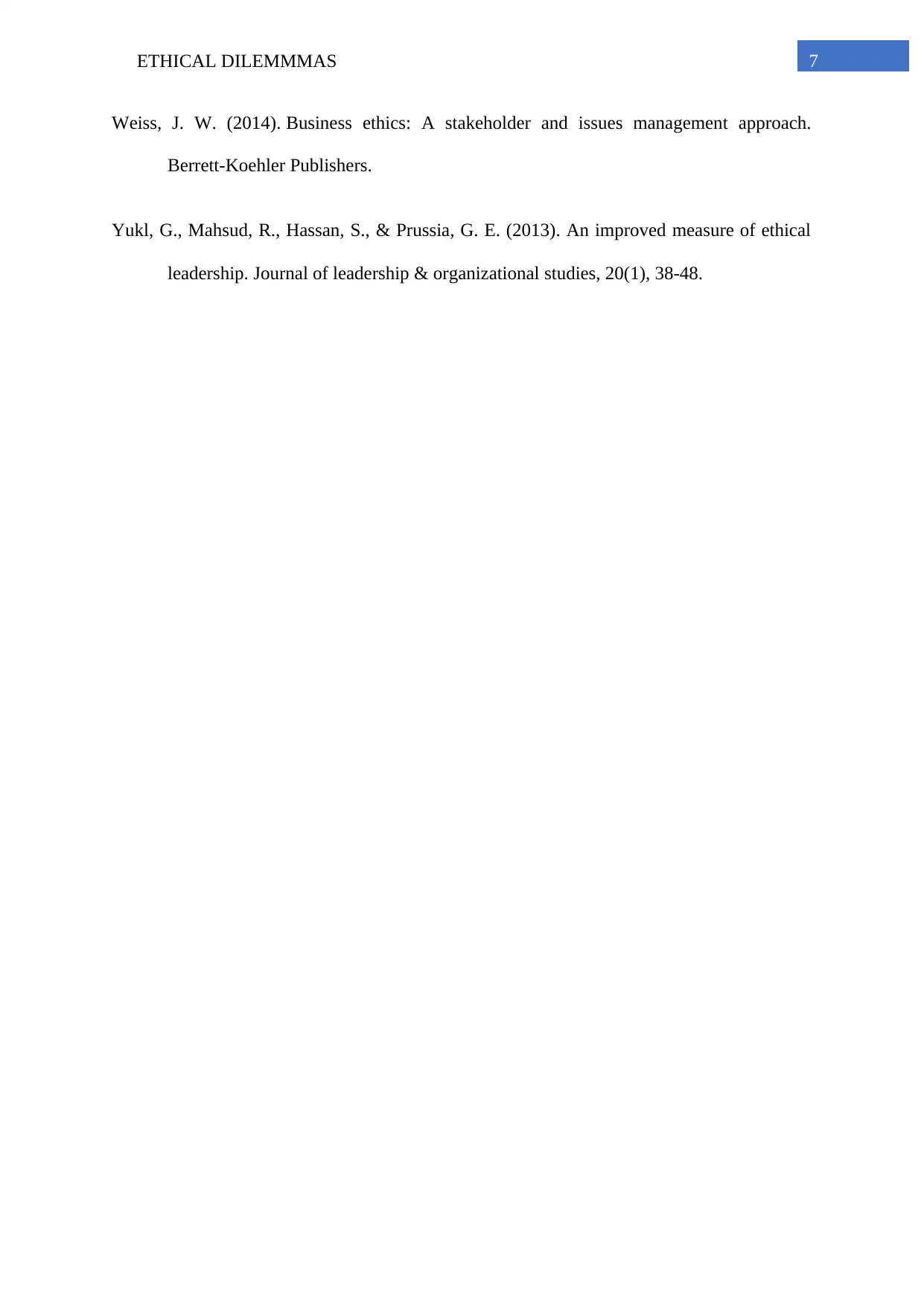
7ETHICAL DILEMMMAS
Weiss, J. W. (2014). Business ethics: A stakeholder and issues management approach.
Berrett-Koehler Publishers.
Yukl, G., Mahsud, R., Hassan, S., & Prussia, G. E. (2013). An improved measure of ethical
leadership. Journal of leadership & organizational studies, 20(1), 38-48.
Weiss, J. W. (2014). Business ethics: A stakeholder and issues management approach.
Berrett-Koehler Publishers.
Yukl, G., Mahsud, R., Hassan, S., & Prussia, G. E. (2013). An improved measure of ethical
leadership. Journal of leadership & organizational studies, 20(1), 38-48.
1 out of 8
Related Documents
Your All-in-One AI-Powered Toolkit for Academic Success.
+13062052269
info@desklib.com
Available 24*7 on WhatsApp / Email
![[object Object]](/_next/static/media/star-bottom.7253800d.svg)
Unlock your academic potential
Copyright © 2020–2026 A2Z Services. All Rights Reserved. Developed and managed by ZUCOL.





